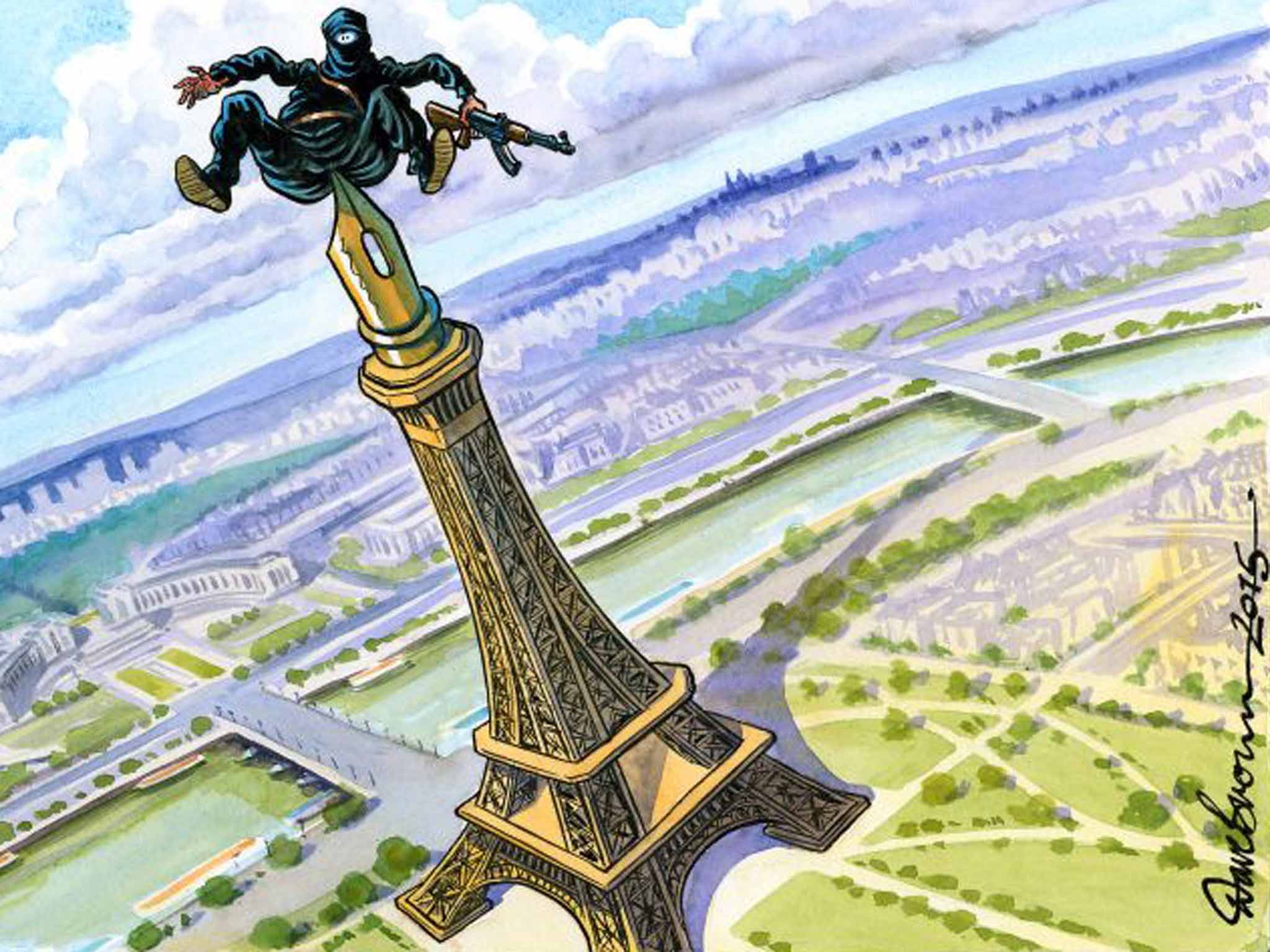Charlie Hebdo: Cartoonists celebrate free speech in new 'Draw the Line Here' book
British cartoonists are planning a book to raise money for their murdered French colleagues' families. This is about free speech, The Independent’s Dave Brown tells Gillian Orr

Your support helps us to tell the story
From reproductive rights to climate change to Big Tech, The Independent is on the ground when the story is developing. Whether it's investigating the financials of Elon Musk's pro-Trump PAC or producing our latest documentary, 'The A Word', which shines a light on the American women fighting for reproductive rights, we know how important it is to parse out the facts from the messaging.
At such a critical moment in US history, we need reporters on the ground. Your donation allows us to keep sending journalists to speak to both sides of the story.
The Independent is trusted by Americans across the entire political spectrum. And unlike many other quality news outlets, we choose not to lock Americans out of our reporting and analysis with paywalls. We believe quality journalism should be available to everyone, paid for by those who can afford it.
Your support makes all the difference.On Wednesday 7 January, Dave Brown, The Independent's political cartoonist since 1996, awoke at 6am as he does every morning. He put on BBC Radio 4's Today programme and listened to it in bed. He then moved downstairs, where he read the papers online while BBC News 24 played in the background. The main story of the day was that Angela Merkel was in London to talk with David Cameron, and Brown, having discussed it with his editors, set to work on a cartoon about the pair meeting.
But then, the office of Charlie Hebdo was raided in Paris, leaving 12 people dead. As so often happens in the work of the political cartoonist, the story of the day had just been usurped and the sketches of the leaders went straight in the bin.
Brown’s response to the killings, a defiant yellow middle finger rising from the blood-stained page, immediately went viral, and was shared all over the world. His was just one of many outraged and sympathetic cartoons that appeared in the aftermath of the massacre.
"I came up with the idea quite quickly," recalls Brown. "It was such an important subject and I wondered if it was strong enough. It was such an initial response and quite simple. But it was an immediate gut feeling and I think that’s why it sort of hit a chord with other people."
Now, English PEN and the Professional Cartoonists Organisation have joined forces to crowdfund Draw the Line Here, a book to celebrate freedom of expression. Various political cartoonists, including Brown, Martin Rowson, Andrew Birch and Jeremy Banx have contributed. Gag cartoonists, illustrators and graphic designers all feature. And half the proceeds will go to the funds supporting the families of the murdered cartoonists and their colleagues.
"It’s fantastic that these cartoonists are using their own right to free speech, to defend and advance the free speech of others," says English PEN’s Robert Sharp.
But what is the life of a political cartoonist actually like? And how does someone even go about becoming one? Brown claims that he "fell into it". Despite always drawing cartoons as a child, after attending art college he decided he wanted to be a serious painter. He struggled to maintain a suitable studio space in London, did some teaching, and eventually won a cartoon competition with a Sunday newspaper in 1989.
"The leader cartoon is like the rest of the comment section," says Brown. "It’s a personal viewpoint. It needs to be more than just a joke. I think the only way to do the job properly is to have that involvement with news, to be angry about things."
The job certainly requires a range of skills. Not only do cartoonists need to be able to draw, but they require a sharp political interest and the ability to deliver a decent gag. Still, that doesn’t put people off trying to break into the profession.
"There are fewer and fewer positions, unfortunately. It’s very difficult for freelance cartoonists out there at the moment. Younger ones are trying to work out how they can make money through the internet, but nobody’s got the model of how to do that yet. I’m one of the lucky ones. It’s not a job I recommend people to come into."
Rather than being fierce competitors, Brown says that there is a rather pleasant camaraderie among all the political cartoonists: "Although we’re rivals to an extent, we also know that we’re comrades in a small field. We all mostly get on," he admits. "With one or two notable exceptions."
Ultimately, Brown insists it’s a privilege to have a voice: "You get an outlet to let off steam in public and have a little visual rant at whoever is annoying you," he says. "But there are times when there is no major news story and you struggle for inspiration. Some days, you will just end up banging your head against the drawing board."
Slow news day or history in the making, long may cartoonists have the freedom to express themselves, however they wish.
The Draw the Line Here campaign is live now on CrowdShed and will run until 14 February. Visit the website here
Join our commenting forum
Join thought-provoking conversations, follow other Independent readers and see their replies
Comments